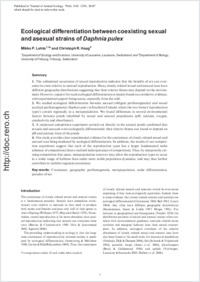Ecological differentiation between coexisting sexual and asexual strains of Daphnia pulex
- Lehto, Mikko P. Department of Ecology and Evolution, University of Lausanne, Switzerland - Department of Biology, University of Fribourg, Switzerland
- Haag, Christoph R. Department of Biology, University of Fribourg, Switzerland
-
13.07.2010
Published in:
- Journal of Animal Ecology. - 2010, vol. 79, no. 6, p. 1241–1250
English
1. The widespread occurrence of sexual reproduction indicates that the benefits of sex can overcome its costs relative to asexual reproduction. Many closely related sexual and asexual taxa have different geographic distributions suggesting that their relative fitness may depend on the environment. However, support for such ecological differentiation is mainly based on correlative evidence, with experimental support being scarce, especially from the wild.2. We studied ecological differentiation between asexual (obligate parthenogenetic) and sexual (cyclical parthenogenetic) Daphnia pulex in Southern Finland, where the two forms (‘reproduction types’) coexist regionally in a metapopulation. We found differences in several environmental factors between ponds inhabited by sexual and asexual populations (pH, calcium, oxygen, conductivity and absorbance).3. A reciprocal competition experiment carried out directly in the natural ponds confirmed that sexuals and asexuals were ecologically differentiated; their relative fitness was found to depend on pH and calcium titres of the ponds.4. Our study provides clear experimental evidence for the coexistence of closely related sexual and asexual taxa being mediated by ecological differentiation. In addition, the results of our competition experiment suggest that each of the reproduction types has a larger fundamental niche (absence of competition) than a realized niche (presence of competition). Thus, by temporarily creating competition-free space, metapopulation turnover may allow the reproduction types to occur in a wider range of habitats than under more stable population dynamics, and may thus further contribute to stabilize regional coexistence.
- Faculty
- Faculté des sciences et de médecine
- Department
- Département de Biologie
- Language
-
- English
- Classification
- Biological sciences
- License
-
License undefined
- Identifiers
-
- RERO DOC 20928
- DOI 10.1111/j.1365-2656.2010.01726.x
- Persistent URL
- https://folia.unifr.ch/unifr/documents/301631
Statistics
Document views: 116
File downloads:
- pdf: 178
